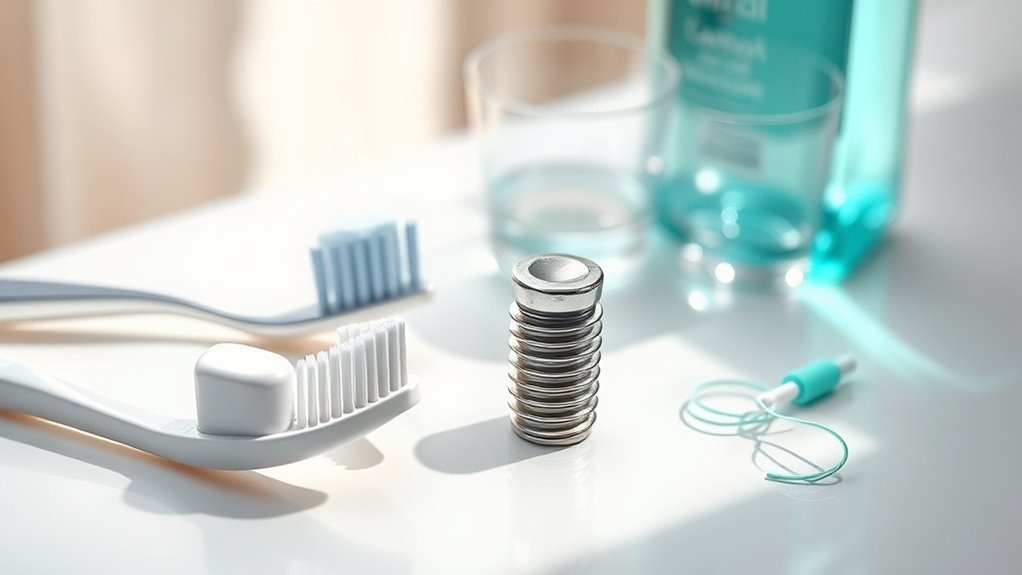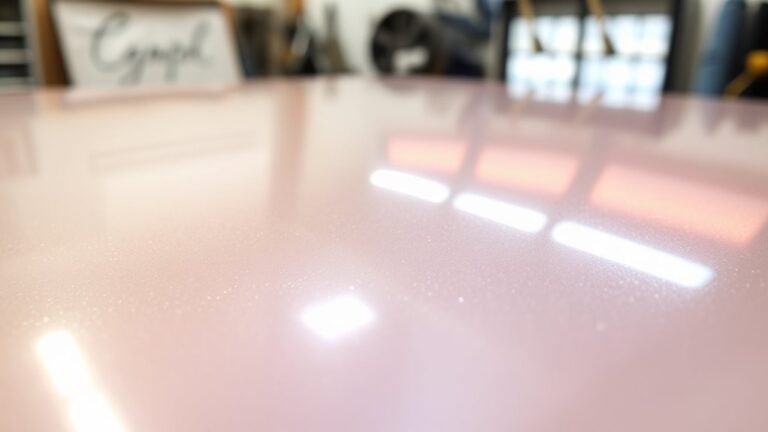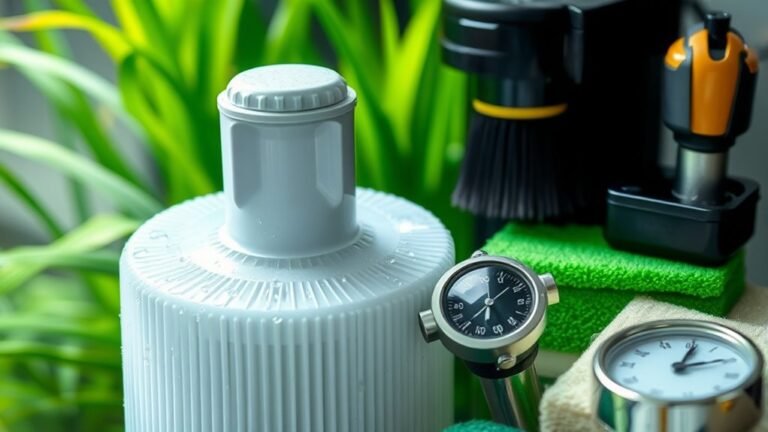How to Clean Dental Implants
To clean your dental implants, gather a soft-bristled toothbrush, non-abrasive toothpaste, dental floss, and antibacterial mouthwash. Brush gently at a 45-degree angle, covering all surfaces. Floss daily to remove debris between implants and natural teeth. Rinse with mouthwash for at least 30 seconds to reduce plaque. Schedule regular dental check-ups for professional advice and cleaning. Maintaining this routine helps guarantee the longevity of your implants. There’s more to learn about effective care strategies.
##
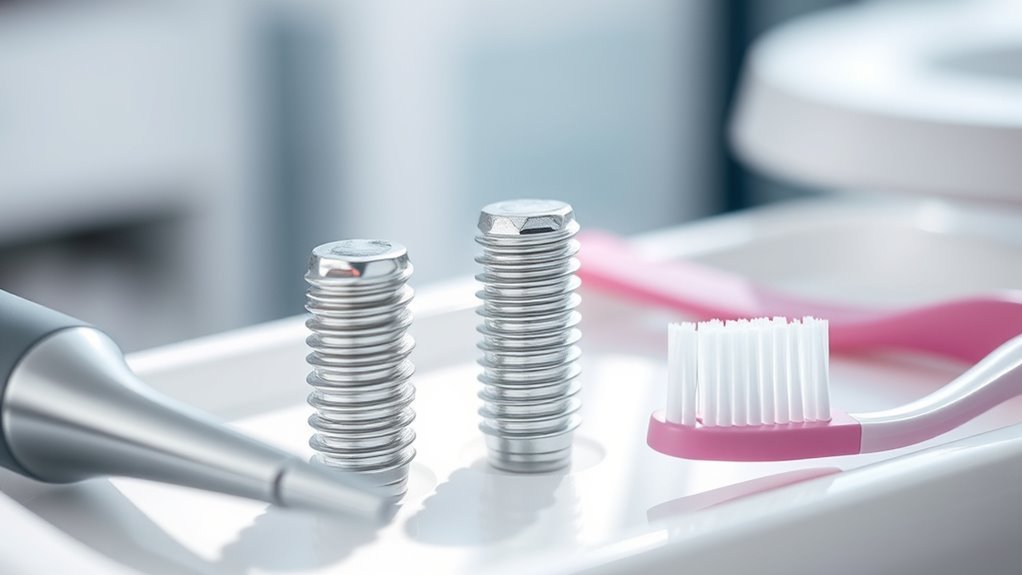
If you’re looking to ensure the cleanliness and health of your dental implants, you’ve come to the right place. This article will provide you with essential tips and practices to maintain proper dental hygiene, which is crucial for the longevity of your implants. You’ll learn about effective brushing techniques, the importance of flossing, and the benefits of using antibacterial mouthwash. Additionally, we’ll emphasize the significance of regular dental visits for professional cleanings and check-ups. By following these guidelines, you can enhance your oral health and enjoy a bright, confident smile for years to come.
Preparation For Cleaning
Before you begin cleaning your dental implants, it’s important to gather the right tools and materials. Start by ensuring you have everything necessary for effective oral hygiene, which will help maintain the longevity of your implants. This includes a soft-bristled toothbrush, non-abrasive toothpaste, and antimicrobial mouthwash. Establishing a regular cleaning schedule is essential; consistency will keep your implants and surrounding gums healthy. Make sure to set aside specific times for cleaning, allowing you to focus on the task without distractions. It’s also wise to consult with your dentist about any additional products that may enhance your cleaning routine. By preparing properly, you’re taking a proactive step toward preserving your dental health and ensuring your implants remain in ideal condition.
Tools and Chemical Required
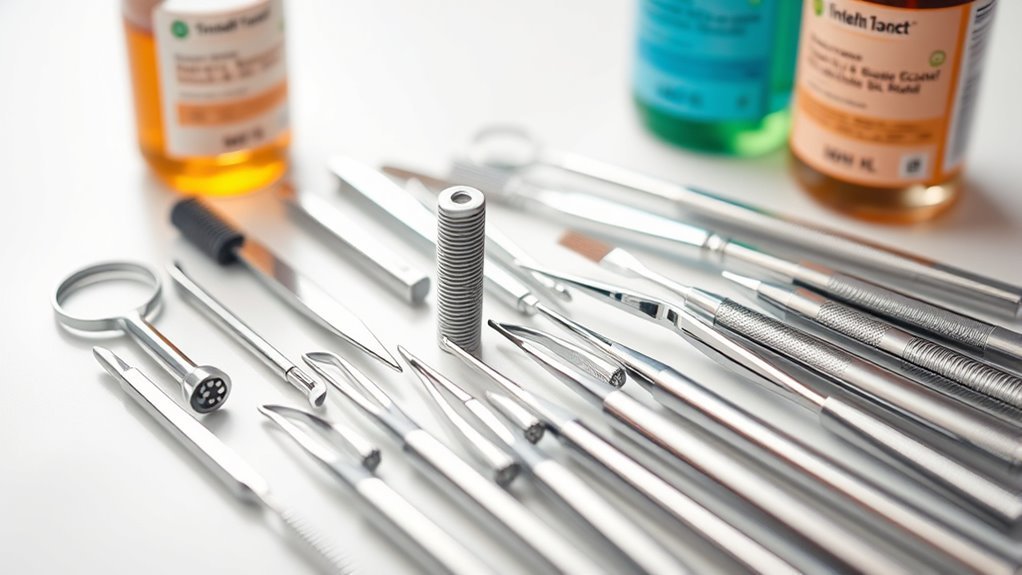
To effectively clean your dental implants, you’ll need specific tools and chemicals that guarantee a thorough and gentle cleaning process. Essential cleaning supplies include a soft-bristle toothbrush, non-abrasive toothpaste, and an ultrasonic cleaner. The ultrasonic cleaner uses high-frequency sound waves to dislodge debris without harming your implants.
Here’s a quick overview of the tools and chemicals you’ll need:
| Tool/Chemical | Purpose |
|---|---|
| Soft-bristle toothbrush | Gentle cleaning of surfaces |
| Non-abrasive toothpaste | Prevents scratches |
| Ultrasonic cleaner | Deep cleaning without abrasion |
How to Clean:
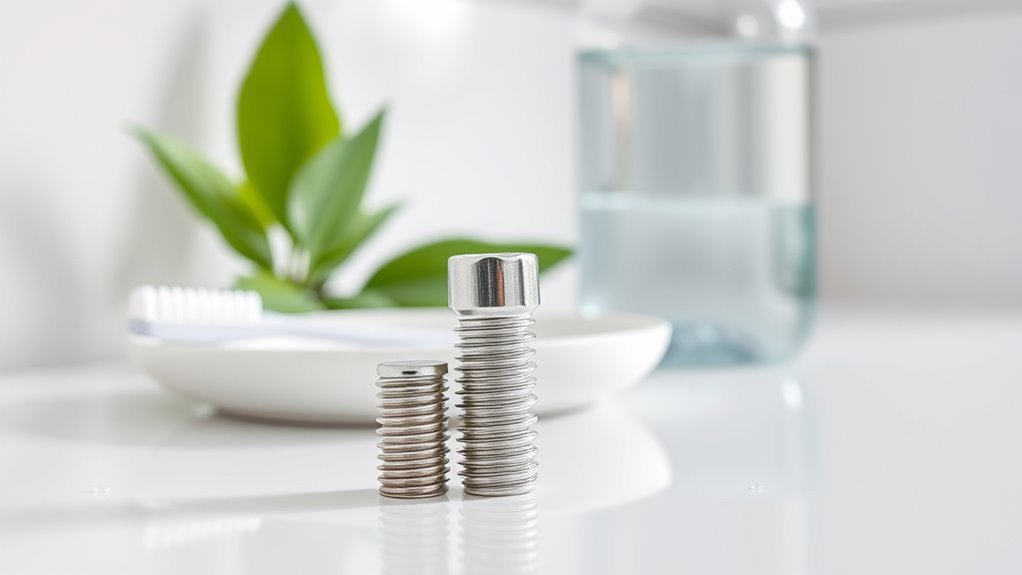
Step 1: Gather Your Supplies
- Soft-bristled toothbrush: Choose a toothbrush specifically designed for sensitive teeth or dental implants.
- Non-abrasive toothpaste: Look for a toothpaste that is gentle and free of harsh ingredients.
- Dental floss: Use a floss specifically made for implants or a floss threader for easier access.
- Antibacterial mouthwash: Select a mouthwash that is alcohol-free to avoid irritation.
- Water: Keep water handy for rinsing.
Step 2: Brush Your Implants
- Angle your toothbrush: Hold your toothbrush at a 45-degree angle to the gum line.
- Gentle strokes: Use gentle, circular motions to clean the surface of the implants without applying too much pressure.
- Cover all areas: Brush all surfaces of the implants thoroughly, including the front, back, and chewing surfaces.
Step 3: Floss Around Your Implants
- Take an adequate length of floss: Cut about 18 inches of floss to ensure you have enough to work with.
- Use a floss threader if necessary: If your implants are positioned closely together, consider using a floss threader for easier access.
- Gently slide the floss: Carefully slide the floss between the implants and your natural teeth, making sure to curve it around the base of each implant to remove plaque.
Step 4: Rinse with Antibacterial Mouthwash
- Measure the mouthwash: Pour the recommended amount of mouthwash into a cup.
- Swish thoroughly: Swish the mouthwash in your mouth for at least 30 seconds, ensuring it reaches all areas around the implants.
- Spit it out: Do not swallow the mouthwash; spit it out into the sink.
Step 5: Maintain Regular Dental Check-ups
- Schedule appointments: Aim for dental check-ups every 6 months or as recommended by your dentist.
- Discuss your implant health: During your appointment, ask your dentist to evaluate the condition of your implants and receive personalized advice.
- Follow professional recommendations: Adhere to any specific care instructions provided by your dentist to ensure the longevity of your implants.
Safety Consideration
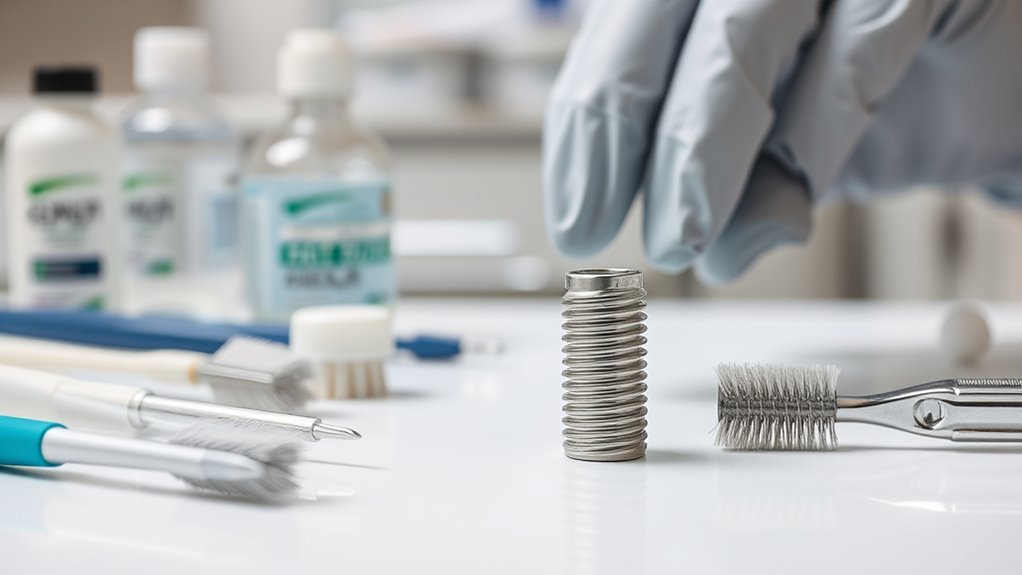
Ensuring the safety of your dental implants is essential for maintaining their longevity and your overall oral health. Prioritizing infection prevention and proper oral hygiene will help you enjoy your implants for years to come. Here are three key considerations:
- Routine Cleaning: Brush twice daily with a soft-bristled toothbrush and non-abrasive toothpaste to prevent plaque buildup.
- Regular Dental Visits: Schedule check-ups every six months to monitor your implants and address any potential issues promptly.
- Avoid Harmful Habits: Steer clear of smoking and excessive alcohol consumption, as they can compromise healing and increase infection risk.
Tips to keep clean for long time
Maintaining the cleanliness of your dental implants over time is vital for preserving their functionality and your oral health. To achieve this, adopt preventive measures such as using a soft-bristled toothbrush and non-abrasive toothpaste. Make it a habit to floss daily, ensuring you reach the areas around your implants. Regular dental check-ups are important; your dentist can provide professional cleanings and monitor your implants’ condition. Establishing maintenance routines, like rinsing with an antimicrobial mouthwash, can greatly reduce plaque buildup. Additionally, avoid hard or sticky foods that may damage your implants. By staying committed to these practices, you’ll enhance the longevity of your dental implants and maintain a healthy, confident smile for years to come.
Frequently Asked Questions
Can I Use Mouthwash on My Dental Implants?
Yes, you can use mouthwash on your dental implants, but it’s crucial to choose the right type. Opt for alcohol-free mouthwash to avoid irritation and dryness. Regular use can enhance your dental hygiene by reducing plaque and bacteria. Just make sure it doesn’t contain harsh ingredients that could damage the implants. Always consult your dentist for recommendations tailored to your specific needs, ensuring you maintain excellent oral health with your implants.
How Often Should I See My Dentist After Getting Implants?
You should see your dentist for post implant checkups at least twice a year. Curiously, studies show that regular checkups can reduce implant failure rates by up to 75%. During these visits, your dentist can provide essential implant maintenance tips, ensuring your implants remain healthy and functional. Staying proactive with your dental care not only preserves your smile but also grants you the freedom to enjoy life without dental worries.
Are There Any Foods I Should Avoid With Dental Implants?
You should avoid sticky foods and hard candies with dental implants. Sticky foods can cling to your implants, making cleaning difficult and increasing the risk of plaque buildup. Hard candies may put excessive pressure on your implants, potentially causing damage. Instead, focus on softer foods that are easier to chew and won’t jeopardize your dental health. Staying mindful of your diet will help guarantee your implants last and maintain their functionality.
What Should I Do if My Implant Feels Loose?
If your implant feels loose, don’t ignore it. Loose implant causes can vary, including bone loss or infection, which raise implant stability concerns. It’s vital to schedule an appointment with your dentist immediately. They’ll assess the situation, potentially using X-rays to determine the underlying issue. Early intervention can help prevent further complications, so taking action promptly is essential for maintaining your oral health and ensuring your implant functions properly.
Can Smoking Affect My Dental Implants?
Yes, smoking can negatively affect your dental implants. The smoking effects include reduced blood flow and impaired healing, both of which can compromise implant success. If you smoke, you’re increasing the risk of complications like infection and implant failure. It’s important to contemplate quitting or reducing your smoking habit to enhance the longevity and effectiveness of your implants. A healthier lifestyle can greatly improve your overall oral health and implant stability.
